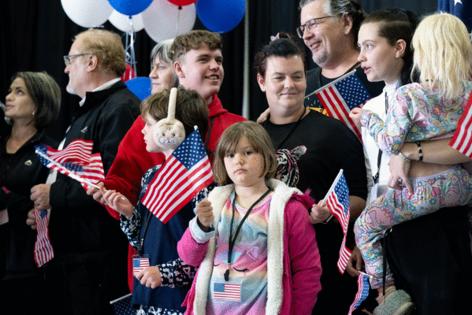Patricia Lopez: Afghan refugees should be treated as well as South African ones
Published in Op Eds
As one of the first acts of his second term, President Donald Trump suspended the U.S. refugee program, not to be restarted “until such time as the further entry into the United States of refugees aligns with the interests of the United States.”
Almost four months later, it is now clear which refugees align with those interests, and which do not: Prosperous, White South African farmers are allowed in, while Afghans fleeing the Taliban are not.
After taking a government-chartered flight to Washington, some 60 South Africans were greeted by Deputy Secretary of State Christopher Landau and other top Trump officials. They will immediately be eligible for many resettlement benefits, including housing, food assistance and other transition aid. Trump has also promised them an expedited path to citizenship, a process that typically takes years.
In February, Trump claimed that the South Africans, or Afrikaners, were fleeing “government-sponsored, race-based discrimination” in their native country. This week, when asked at a news conference why the Afrikaners merited an exception to a program that’s been closed since Jan. 20, Trump said: “Because they’re being killed. … It’s a genocide that’s taking place that you people don’t want to write about.”
It’s ironic that Trump finds it so easy to acknowledge systemic racism in South Africa while denying its effects in the U.S. Even worse is the administration’s admission of White Afrikaners to the U.S., while it works to deport refugees and asylum-seekers — many of whom are not White — already in the country. As for genocide, little evidence has surfaced; according to news reports, an estimated 50 farmers, mostly Afrikaners, were killed in South Africa between January and September of 2024.
It is true that a South African law, which came into effect in January, gives the government the power to confiscate property without compensation. For a real estate developer like Trump, that had to cut deeply. And surely it didn’t hurt that Trump’s biggest donor, South-African-born Elon Musk, made the case on the Afrikaners’ behalf.
Ordinarily a concern for the life, safety and property of a minority group, accompanied by a determination to cut through red tape to get them out of danger, would be cause for praise. For more than seven decades, the U.S. has been offering people from other countries refuge from storms of chaos and violence.
The problem is that Trump has “paused” the entire U.S. refugee admissions program — while an estimated 130,000 conditionally approved refugees, mostly Black and brown-skinned, remain in limbo. This inequality in treatment is too obvious to ignore.
So it’s not surprising that the U.S. Episcopalian Church, which has provided resettlement services for decades, said it would end its partnership with the federal government to help refugees. The church had been expected to help resettle the South Africans refugees as part of its federal grant, but the government’s latest U.S. move crossed a moral line.
“In light of our church’s steadfast commitment to racial justice and reconciliation and our historic ties with the Anglican Church of Southern Africa, we are not able to take this step,” said the church’s presiding bishop in an open letter.
Perhaps no group feels the cruelty of this waiver more sharply than Afghans, many of whom worked side-by-side with U.S. troops in America’s 20-year war against the Taliban. On the day the Afrikaners were being received by a deputy secretary of state, the Trump administration ended Temporary Protected Status for thousands of Afghan refugees already in the U.S., and dashed the hopes of thousands more waiting to come.
TPS provides protection against deportation and offers work permits to those who have it. Without it, an estimated 9,000 Afghans — some of whom have been in the U.S. for more than three years — must leave the country within 60 days or face deportation to Afghanistan, where the ruling Taliban awaits.
This prospect deeply offends U.S. service members who know what a crucial role these Afghans played. Shawn VanDiver, a Navy veteran, is the president of #AfghanEvac, a nonprofit group that has long worked to bring Afghans to the U.S. Van Diver did not serve in Afghanistan, but knows many who did. “They are furious,” he said. “Our veterans that worked with these guys are so angry right now. This country made a promise to these people. They don’t understand what’s going on.”
They are not alone. We Americans are used to being the good guys in this scenario. In that sense, it is not the admission of the Afrikaners that offends America’s values, though their special treatment rankles many, especially those whose work is refugee resettlement. The greater outrage is the suspension of a refugee program that is so badly needed in this world. That’s the scandal Trump should be forced to address.
____
This column reflects the personal views of the author and does not necessarily reflect the opinion of the editorial board or Bloomberg LP and its owners.
Patricia Lopez is a Bloomberg Opinion columnist covering politics and policy. She is a former member of the editorial board at the Minneapolis Star Tribune, where she also worked as a senior political editor and reporter.
_____
©2025 Bloomberg L.P. Visit bloomberg.com/opinion. Distributed by Tribune Content Agency, LLC.



























































Comments